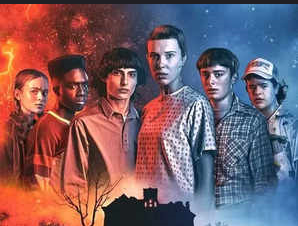A Dive into the World of Web Series: Mirzapur, Sacred Games, The Family Man, Stranger Things, and Kota Factory
Introduction: The world of web series has witnessed a remarkable boom in recent years, offering diverse content that caters to a wide range of audiences. This article delves into the critically acclaimed series Mirzapur, Sacred Games, The Family Man, Stranger Things, and Kota Factory, exploring their plots, character dynamics, and the reasons behind their immense popularity. Additionally, we will discuss the release dates of each series, providing a comprehensive overview for both seasoned viewers and those new to the world of digital storytelling.
Mirzapur: Mirzapur, an Indian crime thriller web series, first premiered on Amazon Prime Video on November 16, 2018. Created by Puneet Krishna and Karan Anshuman, the show is set in the lawless town of Mirzapur, where power, violence, and politics intermingle. The narrative revolves around two families, the Tripathis and the Pandits, whose lives become entangled in the pursuit of power and supremacy.

The web series is known for its gritty storytelling, intense performances, and realistic portrayal of the criminal underworld. Pankaj Tripathi’s portrayal of the ruthless Kaleen Bhaiya has garnered widespread acclaim. With its compelling narrative and memorable characters, Mirzapur has become a cultural phenomenon, leaving an indelible mark on the Indian web series landscape.
Sacred Games: Sacred Games, based on Vikram Chandra’s novel of the same name, premiered on Netflix on July 6, 2018. Co-directed by Anurag Kashyap and Vikramaditya Motwane, the web series unfolds in a non-linear narrative, blending crime, drama, and political intrigue. Sartaj Singh, played by Saif Ali Khan, is a downbeat Mumbai police officer who finds himself entangled in a web of corruption and criminal conspiracies.
Sacred Games explores a diverse range of themes, including religion, power, and the inherent darkness within society. Nawazuddin Siddiqui’s portrayal of the enigmatic crime lord Ganesh Gaitonde has been lauded as one of the standout performances in Indian digital storytelling. The series has received acclaim for its gripping storyline, rich character development, and atmospheric cinematography.
The Family Man: Released on Amazon Prime Video on September 20, 2019, The Family Man is an Indian action thriller web series created by Raj Nidimoru and Krishna D.K. The show follows Srikant Tiwari, played by Manoj Bajpayee, a middle-class man leading a double life as a secret intelligence officer. Balancing domestic responsibilities with national security threats, Srikant navigates a world of espionage and terrorism.
The Family Man has been praised for its unique blend of action, humor, and social commentary. Manoj Bajpayee’s nuanced performance and the show’s realistic portrayal of the intelligence community have contributed to its widespread acclaim. The series has successfully carved a niche for itself in the spy thriller genre, resonating with audiences for its relatable characters and intricate plot twists.
Stranger Things: Stranger Things, an American science fiction horror series created by the Duffer Brothers, premiered on Netflix on July 15, 2016. Set in the 1980s in the fictional town of Hawkins, the show combines supernatural elements with a nostalgic homage to 80s pop culture. The narrative centers around a group of children who encounter mysterious government experiments, parallel dimensions, and a girl with psychokinetic abilities.
Stranger Things has been celebrated for its nostalgic references, strong ensemble cast, and suspenseful storytelling. The series has garnered a massive fan following, becoming a cultural phenomenon and receiving critical acclaim for its blend of horror, adventure, and heartfelt moments. The Duffer Brothers’ ability to evoke a sense of nostalgia while delivering a fresh and engaging narrative has set Stranger Things apart in the world of television.
Kota Factory: Kota Factory, an Indian web series created by Saurabh Khanna, made its debut on TVFPlay on April 16, 2019. Unlike the crime and thriller genres dominating the digital space, Kota Factory explores the lives of students preparing for competitive exams in Kota, known as the coaching capital of India. The series follows Vaibhav, played by Mayur More, as he navigates the challenges of academics, friendships, and personal growth.
Kota Factory stands out for its realistic portrayal of the pressure-cooker environment of competitive exams and the toll it takes on students. The black-and-white cinematography adds a unique aesthetic, and the series has been praised for its authenticity and relatability. By addressing the societal pressures placed on students, Kota Factory has earned acclaim for its sensitive handling of a subject rarely explored in mainstream entertainment.
Release Dates:
- Mirzapur – November 16, 2018
- Sacred Games – July 6, 2018
- The Family Man – September 20, 2019
- Stranger Things – July 15, 2016
- Kota Factory – April 16, 2019
Conclusion: In conclusion, Mirzapur, Sacred Games, The Family Man, Stranger Things, and Kota Factory stand as testament to the evolving landscape of web series, offering diverse genres and narratives that captivate audiences worldwide. Each series brings a unique flavor to the digital storytelling realm, whether through intense crime dramas, supernatural adventures, or realistic portrayals of societal pressures.
As viewers continue to seek compelling narratives and well-developed characters, these web series have set a high standard for quality content. Whether it’s the gritty crime world of Mirzapur, the complex characters of Sacred Games, the action-packed espionage of The Family Man, the nostalgic horror of Stranger Things, or the relatable struggles in Kota Factory, each series contributes to the rich tapestry of web-based storytelling, leaving a lasting impact on the global audience.
Click Here To Watch Top 10 Web Series
Exploring the Success Factors
The success of these web series can be attributed to several key factors that resonate with audiences across the globe. Firstly, the rise of streaming platforms has democratized content consumption, allowing viewers to access a diverse range of shows catering to their specific interests. The ability to binge-watch entire seasons at once has transformed the way audiences engage with narratives, fostering a deeper connection with characters and story arcs.
Secondly, the quality of writing and character development in these series has played a pivotal role in their success. Mirzapur’s intricate portrayal of power dynamics, Sacred Games’ exploration of societal issues through its characters, The Family Man’s blend of action and humor, Stranger Things’ nostalgic references and heartfelt moments, and Kota Factory’s authentic depiction of student life all contribute to the shows’ ability to resonate with a broad audience.
Furthermore, the performances of the cast members have been instrumental in elevating these series to new heights. The nuanced acting of Pankaj Tripathi in Mirzapur, Nawazuddin Siddiqui in Sacred Games, Manoj Bajpayee in The Family Man, the ensemble cast in Stranger Things, and the young actors in Kota Factory have all been widely praised, adding depth and authenticity to the characters they portray.
The visual aesthetics of these series also deserve recognition. Mirzapur captures the raw and gritty atmosphere of its setting, Sacred Games uses its cinematography to create a visually striking narrative, The Family Man employs dynamic action sequences, Stranger Things seamlessly blends horror with a nostalgic 80s aesthetic, and Kota Factory’s black-and-white cinematography enhances its realistic portrayal of student life.
The Global Appeal
What sets these web series apart is their ability to transcend cultural boundaries and appeal to a global audience. Mirzapur and Sacred Games, despite being rooted in Indian settings and culture, have found widespread acclaim internationally, breaking stereotypes and introducing global viewers to the richness of Indian storytelling. Similarly, Stranger Things’ universal themes of friendship, courage, and the supernatural have resonated with audiences worldwide, making it a global phenomenon.
The advent of subtitles and dubbing options on streaming platforms has further facilitated the global reach of these series. Viewers from different linguistic backgrounds can now enjoy the nuances of storytelling in their preferred language, breaking down language barriers and expanding the international fan base for these shows.
Impact on the Industry
The success of these web series has not only transformed the way stories are told but has also influenced the traditional entertainment industry. Streaming platforms have become major players, challenging the dominance of conventional television networks. This shift has allowed for more experimentation in storytelling, pushing boundaries and exploring themes that were previously considered unconventional.
Moreover, the success of these series has paved the way for collaborations between international talent, production houses, and streaming platforms. Co-productions and cross-cultural storytelling have become increasingly common, fostering a global creative exchange that enriches the content available to audiences.
Conclusion
In conclusion, Mirzapur, Sacred Games, The Family Man, Stranger Things, and Kota Factory represent a new era in the world of web series. Their success is a testament to the changing dynamics of storytelling, the power of streaming platforms, and the global appetite for diverse and engaging narratives. As these series continue to capture the imagination of audiences worldwide, it’s evident that the digital age has opened up exciting possibilities for the future of entertainment, with web series at the forefront of this revolution.
Evolution of Storytelling
The success of Mirzapur, Sacred Games, The Family Man, Stranger Things, and Kota Factory also reflects a broader evolution in storytelling techniques. These series have embraced complex narratives, multidimensional characters, and unconventional plot structures, challenging traditional storytelling norms. The willingness to tackle societal issues, explore the darker aspects of human nature, and delve into uncharted territories has resonated with audiences hungry for more intellectually stimulating and emotionally resonant content.
Additionally, the freedom afforded by streaming platforms has allowed creators to take creative risks that might not have been possible in the more regulated landscape of traditional television. This freedom has given rise to narratives that are bold, thought-provoking, and unafraid to tackle controversial subjects, contributing to the elevation of the web series as a legitimate and impactful form of storytelling.
Impact on Viewer Engagement
The binge-watching culture facilitated by streaming platforms has not only transformed the way stories are consumed but has also heightened viewer engagement. The serialized nature of these web series encourages viewers to invest emotionally in the characters and plot, creating a sense of anticipation and community as fans discuss and theorize about unfolding events. This level of engagement extends beyond the screen, with social media platforms becoming virtual spaces for fans to share their thoughts, memes, and fan theories.
The interactive relationship between creators and fans has become a defining feature of these series’ success. Creators often take feedback into account, leading to a collaborative relationship that enhances the viewer’s experience. This real-time interaction has created a sense of ownership among fans, contributing to the long-lasting impact of these series on popular culture.
